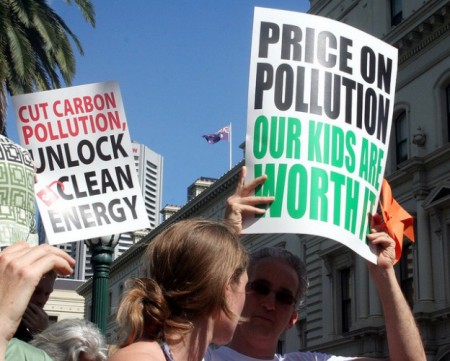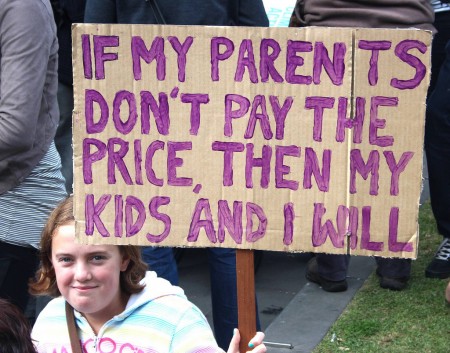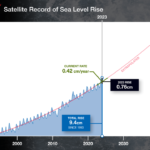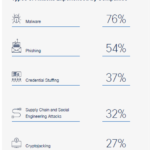April 26, 2016 – In the run up to last Friday’s gathering of national leaders at the United Nations to sign the Paris climate agreement, the heads of both the World Bank and International Monetary Fund (IMF) stated that fossil fuel polluters need to pay for the carbon dioxide and greenhouse gases they emit.
Stated Jim Yong Kim, President of the World Bank, “putting a price on carbon pollution is by far the most powerful and efficient way to reduce emissions.” He continued, “we strongly urge people to prepare for the carbon pricing that is to come.”
The World Bank in 2015 published a report based on a survey of 92 countries entitled, “Shock Waves: Managing the Impacts of Climate Change on Poverty.” In it the authors state, “ending poverty and addressing climate change are the two defining issues of our time.” They go on to observe that the two “cannot be considered in isolation.”
Why so?
Because climate change is the greatest threat to food security particularly in countries with the highest rates of poverty. And climate change is also the greatest threat to health in these countries as well citing climate-related changes to disease vectors.
The report argues that today “climate conditions or climate events are already involved in many cases where households fall into poverty.” It therefore proposes the immediate development of government policies and funding to provide a social safety net for those most at risk and combine it with investments in disaster preparedness to mitigate the worst impacts of anticipated climate change. For example, it will be important to develop and introduce new crop breeds that are drought and heat tolerant for vulnerable areas such as Sub-Saharan Africa where rising global temperatures and changing precipitation patterns are anticipated. If we don’t act the report argues that climate changes by 2030 will likely lead to 100 million more people globally will fall into extreme poverty.
So how does the application of a carbon tax help the poor?
The report states that between now and 2030 “climate policies can do little to alter the amount of global warming that will take place.” So it is necessary for governments to provide a social safety net to provide protection for the most impoverished, to mitigate the impacts of warming. and to subsidize those vulnerable to extra carbon costs applied to essential needs: energy, food, health and shelter.
The World Bank has formed a Carbon Finance Unit to assist countries to price carbon. Funding and technical assistance is helping to implement cap-and-trade and carbon emitter source taxation in 18 countries so far with a near term goal of expanding carbon pricing to cover 25% of global emissions by 2020 and 50% by 2025.
The IMF has also gotten involved to help introduce carbon pricing in countries where the organization consults and advises. In its role as the lender of last resort to failing and cash strapped governments, IMF has provided guidance on practical implementation of carbon pricing to raise revenue and help achieve lower emissions.
In a paper released in January of this year entitled, “After Paris: Fiscal, Macroeconomic, and Financial Implications of Climate Change,” the IMF argues that fiscal policies are a critical component in attacking climate change. It points out ” firms and households are not charged for the environmental consequences of their greenhouse gases from fossil fuels and other sources. This means that establishing a proper charge on emissions – that is, removing the implicit subsidy from the failure to charge for environmental costs – has a central role.” It goes on to state that “carbon pricing through taxes or trading systems designed to behave like taxes should be front and center” as national policy.
The IMF sees carbon pricing as a key to national self interest. That it can contribute to attracting capital flows that can then be applied to mitigation and adaptation. It further states that companies operating within national jurisdictions should fully disclose their carbon footprints and that stress testing for climate risks should be implemented to “ensure financial stability during the transition to a low-carbon economy.”
In the run up to the U.S. Presidential election this November it has amazed me that climate-change and a tax on carbon have not been central to the debates on the future of the nation and the planet. Whereas President Obama has pronounced on the subject on numerous occasions and signed on to a pact with China and COP21 in Paris, both Democratic candidates, Hillary Clinton and Bernie Sanders have skirted the topic making occasional references to reducing the continent’s carbon footprint in cooperation with Canada and Mexico as part of NAFTA, the North American Free Trade Agreement. Sanders has been more forthright with pledges to tax carbon at emission sources, in other words the fossil fuel industry and other large industrial emitters.
On the Republican side their leading candidate, Donald Trump, describes climate change as a hoax. The words carbon tax have not crossed his lips. And the runner up so far, Ted Cruz, states climate scientists are alarmists and has welcomed contributions to his campaign from major coal, oil and natural gas companies. The remaining Republican candidate, John Kasich, the sole “moderate” in the field, has stated that he believes climate change is a real problem but that he doesn’t want “to overreact to it.” You won’ts see the words carbon tax pass his lips.
So what happens to COP21 and the Paris Agreement if any of these Republicans succeed in becoming the next U.S. President? Without the United States an active participant it will be the League of Nations all over again. And if you are unfamiliar with the reference, the lack of American participation in the League weakened it dramatically and led to the rise of a militaristic Japan, the Third Reich and the Second World War.

















